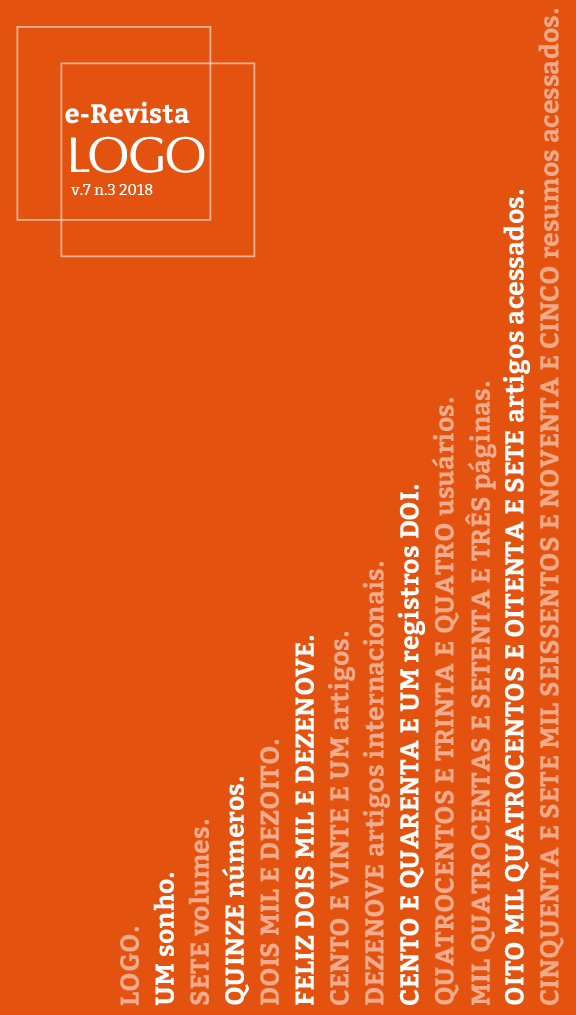The analysis of trends and culture as a tool for brand management
Palavras-chave:
Branding, Trends, Culture.Resumo
Trends Studies dwell on consumer behaviors and patterns, as well
as style and taste, on a cultural and mindset perspective that helps to
better understand the consumer and to set more solid and informed
strategies. Considering the growing importance and diiculty in understanding,
identifying and managing segments, this paper underlines the
importance of trends analysis in the construction and management of a
brand and its audience.
Referências
AAKER, David. Managing Brand Equity. New York: The Free Press,
ATKIN, Douglas. O Culto das Marcas. Quando os consumidores se
tornam verdadeiros crentes. Tradução de LuÃs Jorge, Lisboa: Tinta da
China, 2008.
DAWKINS, Richard. The Selish Gene. Oxford: Oxford University
Press, 2006 [1976].
GLOOR, Peter et al. (2009). “Coolfarming – How Cool People Create
Cool Trendsâ€. DisponÃvel em http://www.ickn.org/documents/edumedia09_
coolfarming.pdf. Acesso em 28/04/2012).
HIGHAM, William. The Next Big ThingL. ondon: Kogan Page, 2009.
HOLT, Douglas e Cameron Douglas. Cultural Strategy: using innovative
ideologies to build breakthrough brands. Oxford: Oxford University
Press, 2010.
KAPFERER, Jean-Noel. [re]inventing the brand. Tradução de Anglia
Translations, London: Kogan Page, 2001.
KAPFERER, Jean-Noel. O que vai mudar as marcas. Tradução de Carolina
Huang, Porto Alegre: Bookman, 2004.
LIPOVETSKY, Gilles. A Felicidade Paradoxal: Ensaio sobre a sociedade
do Hiperconsumo. Traduzido por PatrÃcia Xavier, Lisboa: Edições
, 2006.
SOLOMON, Michael. Consumer Behavior. 4ª edição, New Jersey:
Prentice Hall, 1999.
RASQUILHA, LuÃs. Tendências e Gestão da Inovação. Lisboa: Verlag
Dashofer, 2011.
VEJLGAARD, Henrik. Anatomy of a Trend. New York: McGraw-Hill,
WEBSITE SCIENCE OF THE TIME. DisponÃvel em http://www.scienceofthetime.
com. Acesso em 06-02-2015.
Downloads
Publicado
Edição
Seção
Licença
This journal, following the recommendations of the Open Access movement, provides public access to all its content, following the principle that free access to research generates a greater global exchange of knowledge. Such access is associated with the reading and citing an author's work.
The author must ensure:
-
that there is a full consensus of all co-authors in approving the final version of the document and its submission for publication.
-
that their work is original, and if the work and / or words of other people were used, they were duly recognized.
Plagiarism in all its forms constitute unethical publication behavior and is unacceptable.
The articles and other published works, become the property of the journal.
The contents of e-Journal LOGO are licensed under a Creative Commons License 4.0 by. It reserves the right to use software or other methods of detecting plagiarism to analyze the submitted works.
Under the license you have the right to:
- Share - copy and redistribute the material in any media or format
- Adapt - remix, transform, and create from material to any purpose, even if commercial.
- The licensor can not revoke these rights as long as you respect the license terms.
According to the following terms:
- Assignment - You must give the appropriate credit, provide a link to the license and indicate if changes have been made. You must do so in any reasonable circumstance, but in no way do you suggest to the licensor to support you or your use.
- No additional restrictions - You may not apply legal terms or technological measures that legally restrict others from doing anything that the license permits.
The authors of papers submitted to the e-Journal LOGO authorize their publication in physical and electronic media for academic purposes. The authors also agree on the distribution of articles by national and international indexing databases, whether or not for profit, and can be reproduced as long as the source is cited.
O autor deve garantir:
- que haja um consenso completo de todos os coautores em aprovar a versão final do documento e sua submissão para publicação.
- que seu trabalho é original, e se o trabalho e/ou palavras de outras pessoas foram utilizados, estas foram devidamente reconhecidos.
Plágio em todas as suas formas constituem um comportamento antiético de publicação e é inaceitável.
Os artigos e demais trabalhos publicados, passam a ser propriedade da revista.
Os conteúdos de e-Revista LOGO estão licenciados sob uma Licença Creative Commons 4.0 by. Reserva-se o direito de usar software ou otros métodos de detecção de plágio para analisar os trabalhos submetidos.
Segundo a licença você tem direito de:
- Compartilhar — copiar e redistribuir o material em qualquer suporte ou formato
- Adaptar — remixar, transformar, e criar a partir do material para qualquer fim, mesmo que comercial.
- O licenciante não pode revogar estes direitos desde que você respeite os termos da licença.
De acordo com os termos seguintes:
- Atribuição — Você deve dar o crédito apropriado, prover um link para a licença e indicar se mudanças foram feitas. Você deve fazê-lo em qualquer circunstância razoável, mas de maneira alguma que sugira ao licenciante a apoiar você ou o seu uso.
- Sem restrições adicionais — Você não pode aplicar termos jurídicos ou medidas de caráter tecnológico que restrinjam legalmente outros de fazerem algo que a licença permita.


